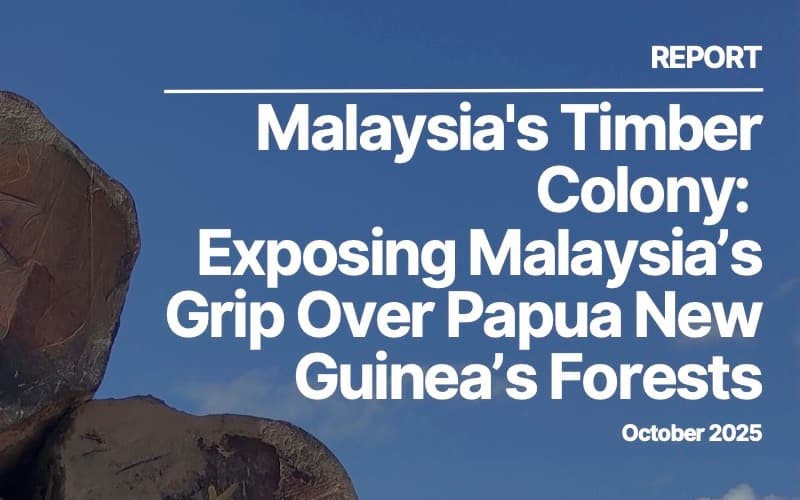New report reveals Malaysian exploitation of PNG forests

A groundbreaking new investigative report: “Malaysia's Timber Colony: Exposing Malaysia’s Grip Over Papua New Guinea’s Forests”, reveals the disturbing role of Malaysian-linked companies in local deforestation. According to its findings, 97% of PNG’s Forest Clearing Authorities (FCAs) are controlled by Malaysian-linked companies.
The report iinvestigates one of the main vehicles for deforestation in Papua New Guinea, Forest Clearing Authorities (FCAs), which is a licensing system for forest conversion in areas larger than 50 hectares. FCAs have been issued by the government on the grounds of agricultural development. In reality, they are mainly being used to fast-track the clear-cutting of intact forests followed by the abandonment of cleared lands, often leaving landowners with environmental destruction and few economic benefits. These FCAs licenses are in high demand from foreign companies – primarily Malaysian-owned timber conglomerates. The report finds that 65 of 67 FCA licences analysed are controlled by Malaysian-linked companies - which translated to 97% of all FCA licenses.
While decades of unchecked logging has left Malaysia with less than 10% of its primary forest cover left, Malaysian timber groups' are now flooding Papua New Guinea with timber business models perfected in Malaysia, involving a colonial-style practice of exploiting forest resources.
One reason for the influx of Malaysian companies in PNG is the nation’s vast natural wealth. Papua New Guinea is one of the world’s 17 ‘mega-diverse’ countries, and its forests, which cover 78% of the country today, are part of the world's third-largest intact tropical forest ecosystem; a celebrated global biodiversity hotspot. However, at least 15% of PNG's forest area have been degraded in recent years, with deforestation ongoing at a rapid pace.
In 2024, Papua New Guinea exported 2.5 million cubic meters of roundwood, making it the world's largest exporter of tropical logs. 38% of these exported logs originated from FCA licences; indicating the burden placed on forests by FCAs. Illustrating this, the report finds that a remaining 1.68 million hectares of forest are still under threat from FCAs, an area larger than the size of Timor-Leste. The vast majority of these threatened forests can be classified as ‘undisturbed forests’, according to this analysis.
“Although landowners own 90% of the land in Papua New Guinea, they have not benefited from the exploitation of their land and remain poor,” says landowner activist Samuel Kime.
“Instead of allowing the destruction of its forests by Malaysian linked companies, Papua New Guinea should invest more in strengthening legal protection for forests and landowners, as well as in alternatives to destructive and unsustainable logging,” says Pamela Avusi, Coordinator of the Environmental Alliance in PNG.
“I am angry to see that the same companies that have destroyed our forests in Malaysian Borneo now do the same to the forests of our friends in Papua New Guinea. Don’t let them take your forests and say no to the companies. Otherwise, your forest will soon be gone like ours,” says Komeok Joe, an Indigenous activist from Sarawak, Malaysia and director of the Penan-NGO Keruan.
In a joint appeal, civil society organizations from PNG, Malaysia and Switzerland call for a cancellation of FCAs, investigations into potential transboundary criminal activities, including money laundering, associated with FCAs, and better protection of native landowners and PNG's forest resources.
A delegation from Papua New Guinea and Malaysia will present the report in Malaysia at a press conference on 21 October at 10:30 a.m. at the headquarters of C4 Center (Center to Combat Corruption and Cronyism).
A petition that calls for an end to FCAs can be found online at http://stopfca.org/.
